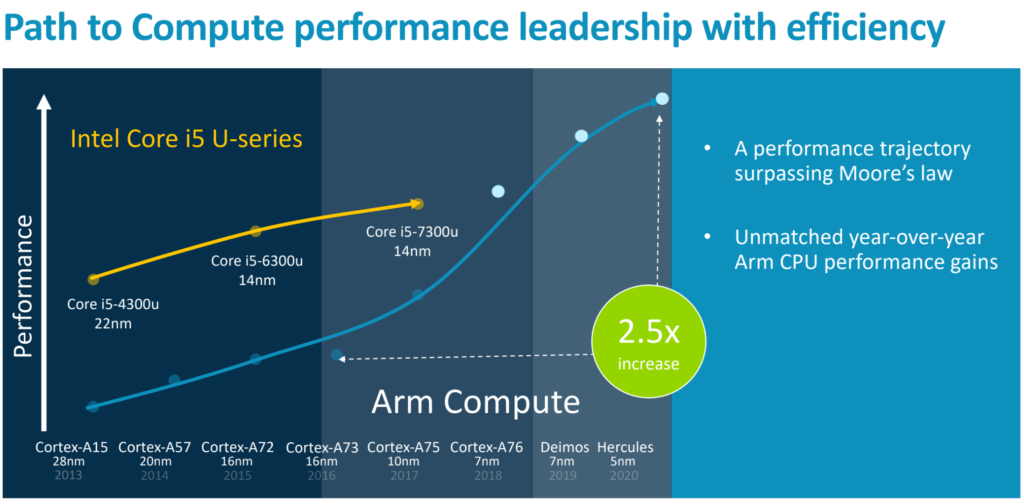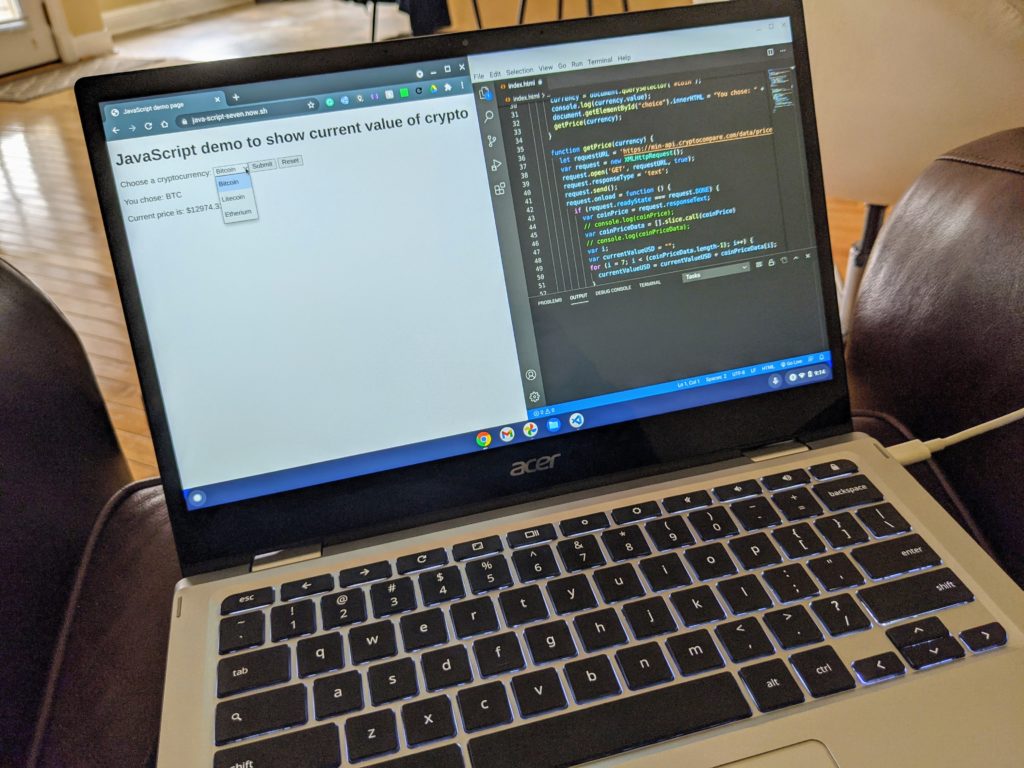This week, MediaTek announced a pair of processors specifically for Chromebooks: The MT8192 and MT8195. Devices using these chipsets are expected in the second quarter of 2021. I’ve been researching the specifications of the MT8192 and MT8195, finding several attributes that suggest better performance than the Qualcomm Snapdragon 7c that powers the Acer Chromebook Spin 513.
This shouldn’t be too surprising if you’ve been following mobile SOC (system on a chip) news for the past year or two. The Snapdragon 7c (and higher performing 8c) chipset was announced nearly a year ago. It’s based on an 8nm process and has 8 computing cores: Two Cortex-A76 cores with up to a 2.4 GHz clock speed and 6 low-power Cortex-A55 chip cores.
More efficient process and a newer architecture
Both of the newer MediaTek chips for Chromebooks either meet or exceed potential performance based on more recent ARM architecture designs and/or a more power-efficient build process that can pack more transistors into the same space.
Let’s start a 7c comparison with the M8195, which is the higher-end of the two new MediaTek chipsets.
It’s built on TSMCs 6nm process, so there are immediate power efficiency gains available simply based on the transistor density. Like the Snapdragon 7c, it has 8 CPU cores. Unlike the 7c are the configuration and ARM architecture. The M8912 has four high-power Cortex-A78 cores and four of the same Cortex-A55 cores as the 7c.
Just to add more context about those four Cortex-A78 cores, consider the CPU roadmap ARM shared back in 2018:

You can see that Cortex-A76 chips such as those used in the Snapdragon 7c were a nice expected upgrade over chips using older architectures. But the Cortex-A78’s in MediaTek’s new SOCs will bring another leap in performance.
When the ARM roadmap came out in 2018, I noted the expected performance leap, saying I’d anticipate that more Chrome OS hardware partners consider using Arm-based processors in their Chromebooks over the next 12 to 24 months. And when this architecture was announced earlier this year, The Verge said to expect 2021 flagship smartphones built around it.
Even the lower-end MT8192 is no slouch by comparison to the Snapdragon 7c. It uses the same Cortex-A76 cores but has four instead of two. Of course, that means having two fewer of the more power-efficient Cortex-A55 cores.
So what does all this mean for ARM-based Chromebooks?

We know that in a few months the Acer Chromebook Spin 513 with the Snapdragon 7c compute platform will be available for purchase, starting at $399. More storage and/or integrated LTE will cost you more. And it will likely be on sale at least a few months before any Chromebooks with the new MediaTek processors arrive.
When they do, however, you’ll have a choice to make if you want a new ARM-based Chromebook. Much of that will depend on the prices between Qualcomm- and MediaTek-powered devices, and we don’t know that yet. We do know if you want integrated LTE, you’ll likely opt for the Acer: Qualcomm’s integrated modems are among the best in the business.
But if you want more performance or features such as the ability to drive three displays and have support for Dolby Vision and 7.1 surround sound (found in the MT8195) or a full-HD display at 120Hz, you might want to take a new MediaTek-powered Chromebook for a spin. Think of at least a step-generation improvement in performance as compared to the already capable Lenovo Chromebook Duet, which runs on a MediaTek MT8183.
Either way, we’re finally starting to see real progress and potential in ARM-based Chromebooks. Up to now if you wanted one with mid- to high-end performance, Intel was your likely your first and only choice. In 2021, you’ll have another chip contender worth considering.


6 Comments
Because of the use cases for Chromebooks and the potential for ARM CPUs to compete with Intel on the high end, it’s going to get a little difficult to recommend CPUs that give the best performance value. The use cases, as I see them, are: nearly all Web app, moderate to heavy Android app use, Linux use, Linux development, Windows app use (eventually).
An area I’m interested to better understand, is why are all the MT8192 Chromebooks limited to 4GB RAM? While they make great budget devices, a little more RAM would make them awesome Android devices, especially in the 10″+ space, where there is now a dearth of options. Was there something about the 8192 that made 4GB a hard limit, and will either of the new Mediatek devices open that up?
My bad, I’ve referred to the 8192 in my previous comment instead of the 8183 (that powers the Duet). I meant to be comparing the upcoming 8195 with the existing 8183
My bad, I’ve referred to the 8192 in my previous comment instead of the 8183 (that powers the Duet). I meant to be comparing the upcoming 8195 with the existing 8183
Chromebooks don’t need “the best” 5G capability. They aren’t phones. “Good” 5G capability is fine. Also, the main reason to prefer MediaTEK SOCs over the Qualcomm 7cx are:
1. The Qualcomm 7cx is their low end laptop chips, comparable to Intel Celeron. You need Qualcomm 8cx to get Intel Core i3 performance. Or even the new Cortex super core that is supposed to rival Intel Core i5 performance in 2021.
2. MediaTEK SOCs are the only ARM SOCs that Google has licensed for Linux support. Maybe that will change next year – especially if the Whitechapel rumours are true – but until we get a firm announcement, if you are a productivity user your Chromebook options are strictly Intel, AMD and MediaTEK in that order, and that is regardless of how well Qualcomm Chromebooks run Android apps.
3. ChromeOS has officially surpassed macOS as a computing platform and by a not-insignificant margin. https://www.canalys.com/newsroom/worldwide-pc-market-Q3-2020
So expect to see its devices attract more manufacturer and more importantly developer support going forward.
Yes in 3Q 2020 Apple sold about 6,842,000 Mac computers or 5.5% of worldwide PC market shipments whereas all Chromebook manufacturers combined sold about 9,481,000 units worldwide or about 7.6% of PC shipments in the same period. Can the Chromebook manufacturers sustain current growth – currently running at more than 100% year-on-year – going into 2021? I suspect that part of the step increase will prove durable and for relatively inexpensive Chromebooks there may even be additional rapid growth in unit sales. But, Apple, in my view, owing to the custom silicon rollout is the company most likely to see dramatic growth – both in tablets and notebooks – at the expense of its competitors in 2021.
Mediatek silicon might help sustain a strong defensive line for good quality entry level Chromebooks but trying to market Chromebooks equipped with the MT8192 as ‘mainstream’ would be a mistake. And the MT8195, the genuine mainstream SoC from Mediatek, won’t be arriving before early 2022.
The availability of Apple’s custom ARM silicon will also likely increase the reluctance of consumers to hurry a purchase of the latest premium Intel Tiger Lake and AMD Zen 3 laptops, whether they be Wintel notebooks or Chromebooks. Why pay ridiculously high prices for those when you can get an M1 MacBook Air for USD$1000 after only a modest price gouge.
One wildcard is whether Whitechapel is intended for Chromebooks. As nothing is showing up in the repositories my guess would be that it isn’t.